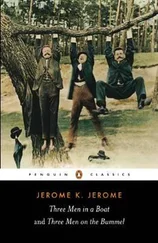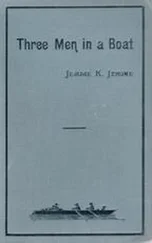Jerome Jerome - Three Men in a Boat (To Say Nothing of the Dog)
Здесь есть возможность читать онлайн «Jerome Jerome - Three Men in a Boat (To Say Nothing of the Dog)» — ознакомительный отрывок электронной книги совершенно бесплатно, а после прочтения отрывка купить полную версию. В некоторых случаях можно слушать аудио, скачать через торрент в формате fb2 и присутствует краткое содержание. Жанр: Юмористическая проза, Классическая проза, на английском языке. Описание произведения, (предисловие) а так же отзывы посетителей доступны на портале библиотеки ЛибКат.
- Название:Three Men in a Boat (To Say Nothing of the Dog)
- Автор:
- Жанр:
- Год:неизвестен
- ISBN:нет данных
- Рейтинг книги:3 / 5. Голосов: 1
-
Избранное:Добавить в избранное
- Отзывы:
-
Ваша оценка:
- 60
- 1
- 2
- 3
- 4
- 5
Three Men in a Boat (To Say Nothing of the Dog): краткое содержание, описание и аннотация
Предлагаем к чтению аннотацию, описание, краткое содержание или предисловие (зависит от того, что написал сам автор книги «Three Men in a Boat (To Say Nothing of the Dog)»). Если вы не нашли необходимую информацию о книге — напишите в комментариях, мы постараемся отыскать её.
Three Men in a Boat (To Say Nothing of the Dog) — читать онлайн ознакомительный отрывок
Ниже представлен текст книги, разбитый по страницам. Система сохранения места последней прочитанной страницы, позволяет с удобством читать онлайн бесплатно книгу «Three Men in a Boat (To Say Nothing of the Dog)», без необходимости каждый раз заново искать на чём Вы остановились. Поставьте закладку, и сможете в любой момент перейти на страницу, на которой закончили чтение.
Интервал:
Закладка:
If most men were like a fellow I saw on the Yarmouth boat one day, I could account for the seeming enigma easily enough. It was just off Southend Pier, I recollect, and he was leaning out through one of the port-holes in a very dangerous position. I went up to him to try and save him.
"Hi! come further in," I said, shaking him by the shoulder. "You'll be overboard."
"Oh my! I wish I was," was the only answer I could get; and there I had to leave him.
Three weeks afterwards, I met him in the coffee-room of a Bath hotel, talking about his voyages, and explaining, with enthusiasm, how he loved the sea.
"Good sailor!" he replied in answer to a mild young man's envious query; "well, I did feel a little queer once , I confess. It was off Cape Horn. The vessel was wrecked the next morning."
I said:
"Weren't you a little shaky by Southend Pier one day, and wanted to be thrown overboard?"
"Southend Pier!" he replied, with a puzzled expression.
"Yes; going down to Yarmouth, last Friday three weeks."
"Oh, ah-yes," he answered, brightening up; "I remember now. I did have a headache that afternoon. It was the pickles, you know. They were the most disgraceful pickles I ever tasted in a respectable boat. Did you have any?"
For myself, I have discovered an excellent preventive against sea-sickness, in balancing myself. You stand in the centre of the deck, and, as the ship heaves and pitches, you move your body about, so as to keep it always straight. When the front of the ship rises, you lean forward, till the deck almost touches your nose; and when its back end gets up, you lean backwards. This is all very well for an hour or two; but you can't balance yourself for a week.
George said:
"Let's go up the river."
He said we should have fresh air, exercise and quiet; the constant change of scene would occupy our minds (including what there was of Harris's); and the hard work would give us a good appetite, and make us sleep well.
Harris said he didn't think George ought to do anything that would have a tendency to make him sleepier than he always was, as it might be dangerous.
He said he didn't very well understand how George was going to sleep any more than he did now, seeing that there were only twenty-four hours in each day, summer and winter alike; but thought that if he did sleep any more, he might just as well be dead, and so save his board and lodging.
Harris said, however, that the river would suit him to a "T." I don't know what a "T" is (except a sixpenny one, which includes bread-and-butter and cake ad lib. , and is cheap at the price, if you haven't had any dinner). It seems to suit everybody, however, which is greatly to its credit.
It suited me to a "T" too, and Harris and I both said it was a good idea of George's; and we said it in a tone that seemed to somehow imply that we were surprised that George should have come out so sensible.
The only one who was not struck with the suggestion was Montmorency. He never did care for the river, did Montmorency.
"It's all very well for you fellows," he says; "you like it, but I don't. There's nothing for me to do. Scenery is not in my line, and I don't smoke. If I see a rat, you won't stop; and if I go to sleep, you get fooling about with the boat, and slop me overboard. If you ask me, I call the whole thing bally foolishness."
We were three to one, however, and the motion was carried.
CHAPTER II
Plans discussed.-Pleasures of "camping out," on fine nights.-Ditto, wet nights.-Compromise decided on.-Montmorency, first impressions of.-Fears lest he is too good for this world, fears subsequently dismissed as groundless.-Meeting adjourns.
WE pulled out the maps, and discussed plans.
We arranged to start on the following Saturday from Kingston. Harris and I would go down in the morning, and take the boat up to Chertsey, and George, who would not be able to get away from the City till the afternoon (George goes to sleep at a bank from ten to four each day, except Saturdays, when they wake him up and put him outside at two), would meet us there.
Should we "camp out" or sleep at inns?
George and I were for camping out. We said it would be so wild and free, so patriarchal like.
Slowly the golden memory of the dead sun fades from the hearts of the cold, sad clouds. Silent, like sorrowing children, the birds have ceased their song, and only the moorhen's plaintive cry and the harsh croak of the corncrake stirs the awed hush around the couch of waters, where the dying day breathes out her last.
From the dim woods on either bank, Night's ghostly army, the grey shadows, creep out with noiseless tread to chase away the lingering rear-guard of the light, and pass, with noiseless, unseen feet, above the waving river-grass, and through the sighing rushes; and Night, upon her sombre throne, folds her black wings above the darkening world, and, from her phantom palace, lit by the pale stars, reigns in stillness.
Then we run our little boat into some quiet nook, and the tent is pitched, and the frugal supper cooked and eaten. Then the big pipes are filled and lighted, and the pleasant chat goes round in musical undertone; while, in the pauses of our talk, the river, playing round the boat, prattles strange old tales and secrets, sings low the old child's song that it has sung so many thousand years-will sing so many thousand years to come, before its voice grows harsh and old-a song that we, who have learnt to love its changing face, who have so often nestled on its yielding bosom, think, somehow, we understand, though we could not tell you in mere words the story that we listen to.
And we sit there, by its margin, while the moon, who loves it too, stoops down to kiss it with a sister's kiss, and throws her silver arms around it clingingly; and we watch it as it flows, ever singing, ever whispering, out to meet its king, the sea-till our voices die away in silence, and the pipes go out-till we, common-place, everyday young men enough, feel strangely full of thoughts, half sad, half sweet, and do not care or want to speak-till we laugh, and, rising, knock the ashes from our burnt-out pipes, and say "Good-night," and, lulled by the lapping water and the rustling trees, we fall asleep beneath the great, still stars, and dream that the world is young again-young and sweet as she used to be ere the centuries of fret and care had furrowed her fair face, ere her children's sins and follies had made old her loving heart-sweet as she was in those bygone days when, a new-made mother, she nursed us, her children, upon her own deep breast-ere the wiles of painted civilization had lured us away from her fond arms, and the poisoned sneers of artificiality had made us ashamed of the simple life we led with her, and the simple, stately home where mankind was born so many thousands years ago.
Harris said:
"How about when it rained?"
You can never rouse Harris. There is no poetry about Harris-no wild yearning for the unattainable. Harris never "weeps, he knows not why." If Harris's eyes fill with tears, you can bet it is because Harris has been eating raw onions, or has put too much Worcester over his chop.
If you were to stand at night by the sea-shore with Harris, and say:
"Hark! do you not hear? Is it but the mermaids singing deep below the waving waters; or sad spirits, chanting dirges for white corpses, held by seaweed?" Harris would take you by the arm, and say:
"I know what it is, old man; you've got a chill. Now, you come along with me. I know a place round the corner here, where you can get a drop of the finest Scotch whisky you ever tasted-put you right in less than no time."
Harris always does know a place round the corner where you can get something brilliant in the drinking line. I believe that if you met Harris up in Paradise (supposing such a thing likely), he would immediately greet you with:
Читать дальшеИнтервал:
Закладка:
Похожие книги на «Three Men in a Boat (To Say Nothing of the Dog)»
Представляем Вашему вниманию похожие книги на «Three Men in a Boat (To Say Nothing of the Dog)» списком для выбора. Мы отобрали схожую по названию и смыслу литературу в надежде предоставить читателям больше вариантов отыскать новые, интересные, ещё непрочитанные произведения.
Обсуждение, отзывы о книге «Three Men in a Boat (To Say Nothing of the Dog)» и просто собственные мнения читателей. Оставьте ваши комментарии, напишите, что Вы думаете о произведении, его смысле или главных героях. Укажите что конкретно понравилось, а что нет, и почему Вы так считаете.












![Helen Rowland - The Widow [To Say Nothing of the Man]](/books/752764/helen-rowland-the-widow-to-say-nothing-of-the-man-thumb.webp)